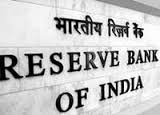RBI Clears Decks For On-Tap Banking, Bars Big Corporates
Mumbai: Paving the way for entry of new players in banking sector, the Reserve Bank today heralded ‘on tap’ universal banking licence regime, but excluded large industrial houses from the purview though they can invest up to 10 per cent in new banks.
At present, there are 27 public sector banks and 24 private sector banks in the country.
“The licensing window will be open on-tap, and the applications … could be submitted to the RBI at any point of time,” according to the ‘Guidelines for ‘on tap’ Licensing of Universal Banks in the Private Sector’ released by RBI.
As per the guidelines, the initial minimum paid-up voting equity capital for a bank should be Rs 500 crore and thereafter, the bank should have a minimum net worth of Rs 500 crore at all times.
“Large industrial houses are excluded as eligible entities but are permitted to invest in the banks up to 10 per cent,” the guidelines said.
Individuals/professionals who are ‘residents’ and have 10 years of experience in banking and finance at a senior level and existing non-banking financial companies (NBFCs) that are ‘controlled by residents’ and have a successful track record for at least 10 years can apply for the licence.
Further, “entities/groups in the private sector that are ‘owned and controlled by residents’ and have a successful track record for at least 10 years, provided that if such entity/group has total assets of Rs 5,000 crore or more, the non-financial business of the group does not account for 40 per cent or more in terms of total assets/in terms of gross income” are also eligible promoters.
The applicant would have to pass the ‘Fit and Proper’ criteria. According to it, promoter/promoting entity/promoter group should have a past record of sound financials, credentials, integrity and have a minimum 10 years of successful track record.
The foreign shareholding in the bank would be as per the existing FDI. At present, the aggregate foreign investment limit is 74 per cent.
While assuming charge on September 4, 2013, Governor Raghuram Rajan had said one of his key reform measures would to put bank licensing on-tap. He fulfilled a part of it in April 2014 by issuing in-principal approvals to two-infra lender IDFC and microfinancier Bandhan, out of 25 applicants. Both of them are operational since last year. These banks came in after a gap of over a decade.
Besides, the RBI gave in-principle approval to 10 payments banks and 11 small finance banks last year.
RBI had last issued guidelines for licensing of new banks in the private sector on February 22, 2013. Consequently, the RBI issued in-principle approval to two applicants and they have since established the banks (Bandhan Bank and IDFC Bank).
On approval process, RBI said that the applications will be referred to a Standing External Advisory Committee (SEAC) to be set up by the Reserve Bank. The validity of the in-principle approval issued by the RBI will be 18 months from the date of granting in-principle approval and would thereafter lapse automatically.
The bank should get its shares listed on the stock exchanges within six years of the commencement of business by the bank. The bank shall open at least 25 per cent of its branches in unbanked rural centres (population up to 9,999 as per the latest census).
The bank should comply with the priority sector lending targets and sub-targets and the board of the bank should have a majority of independent directors are some of the other conditions outlined in the guidelines.
Kindly send reply or comments on this topic to [email protected]
Source:Ndtv




